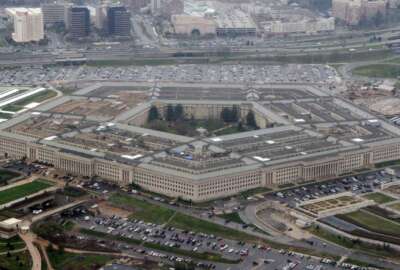

John Gibson, Defense Department chief management officer, says only back office services will be combined in commissaries and exchanges.
The Defense Department’s top management official says the Pentagon is actively exploring ways to make the retail and grocery operations it runs on military bases around the world more efficient.
But John Gibson, the department’s chief management officer, denied what he said were rumors that the management of commissaries and exchanges would be combined in ways that might degrade the benefits servicemembers, their families and retirees receive.
In a speech to the Association of Defense Communities on June 19, Gibson said a task force the department assembled is looking at ways to restructure and combine back-office operations and supply line activities in order to save money and create efficiencies. But none of the changes will be apparent to consumers, he said.
“Because you have a number of businesses that have similar missions, there are efficiencies to be found,” Gibson said. “What we’ve done is say, ‘Okay. There have been a number of studies that are still valid.’ How do we find greater efficiencies there while keeping the whole system itself robust?”
Gibson said he does not know how the back office changes will look at this point, but the task force looking into efficiencies is approaching the problem from a “merger and acquisition” standpoint, and will create a roadmap to combine their operations at some point.
“We respect the [commissary] benefit, we respect the potential for spousal employment, we recognize that this brand that is customer-facing has a significant place in who we are, that’s not being touched,” Gibson said. “But we also believe there is tremendous opportunity that when you have several different major operations to find benefits in that back office.”
Gibson seemed to try to clarify and calm consumers about reports of a draft memo from July 2017 that would merge three military exchange services with the Defense Commissary Agency (DeCA).
Despite Gibson’s claims, lawmakers are making sure DoD does its homework before bringing the exchanges and commissaries together.
The House version of 2019 defense authorization bill tells DoD to submit a report with financial assessment, business case analysis and integration plans for consolidating the systems by 2019. It also restricts DoD from using funds to consolidate them.
DoD still needs to do something about how it’s commissaries and exchanges are run, though, according to the Government Accountability Office.
A March 2017 GAO report stated DeCA “may be missing opportunities to increase sales, leverage efficiencies, and achieve savings in commissary operations.”
A 2016 GAO report stated commissaries and exchanges will not be able to achieve budget neutrality, which it needs to end the use of appropriated funding. DoD stated it would save $2 billion in commissaries from 2017 to 2021. However, GAO found the cost savings amount was an arbitrary estimate, and DoD did not develop details on the steps they would take to achieve $2 billion in saving.
DoD operates 238 commissaries worldwide, which receive about $1.4 billion a year in subsidies. About 27.5 percent of those appropriated funds go to “back office” expenditures like transportation, material and supplies and equipment.
Copyright © 2025 Federal News Network. All rights reserved. This website is not intended for users located within the European Economic Area.
Scott Maucione is a defense reporter for Federal News Network and reports on human capital, workforce and the Defense Department at-large.
Follow @smaucioneWFED

